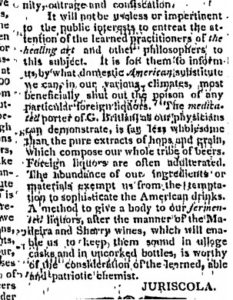 As our neighbours to the south watch the beginning of what I can only consider the death of conservatism by slowly inflicted suicide, it is instructive to note that the role of beer in nationalistic jingoism is something no longer often given its full weight. That clipping to the right is from the 7 September 1810 edition of that most wonderfully named newspaper from Hudson, New York, The Bee, reprinted from the National Intelligencer. The author is arguing that British porter is unwholesome. Common enough claim at the time. It’s the final of a number of arguments made in an essay published under the pen name Juriscola. The man behind the clever tag appears to be Tench Coxe, aka “Mr. Facing Bothways” for his habit of flapping which ever way the wind blows. By 1810, he was pro-tariff and definitely buy American after a career that saw him welcome the British to Philadelphia in 1777 with open arms.
As our neighbours to the south watch the beginning of what I can only consider the death of conservatism by slowly inflicted suicide, it is instructive to note that the role of beer in nationalistic jingoism is something no longer often given its full weight. That clipping to the right is from the 7 September 1810 edition of that most wonderfully named newspaper from Hudson, New York, The Bee, reprinted from the National Intelligencer. The author is arguing that British porter is unwholesome. Common enough claim at the time. It’s the final of a number of arguments made in an essay published under the pen name Juriscola. The man behind the clever tag appears to be Tench Coxe, aka “Mr. Facing Bothways” for his habit of flapping which ever way the wind blows. By 1810, he was pro-tariff and definitely buy American after a career that saw him welcome the British to Philadelphia in 1777 with open arms.
Nationalism is not solely an argument heard from the USA. Pete maps the role of ale and porter in the second British Empire of the Victorian height in his book Hops and Glory at scale, as we have just discussed. And ten years after Coxe’s essay, a rabble was being roused right here in in what was the Midland District of Upper Canada by brewer Richard Dalton against the importation of those foreign beers from the south. And likely with good cause if the presence of 160 barrels of Albany Ale in 1816 in our small community is evidence enough. Not even an alternate fact, that. Dalton’s argument is pretty specific: stop bringing in foreign barley. Coxe, by comparison, lays it on thicker. Certainly, the argument is made that domestic grain and fruit supports increased domestic manufacturing. And also that domestic production is superior as an expression of American ingenuity. But then he makes a telling argument: the needs of the military.
The most enormous expense of the American revolutionary war and the deepest sufferings of the patriotic army were those produced by the frequent destitution of wine, good distilled spirits and porter. It is therefore of the greatest importance to our possible military operations that we have a quantity of some of these liquors steadily manufactured in our country from our own materials equal at least to ten millions of gallons.
Note: by “possible military operations” he basically means attacking my town.
So, how will this sort of thing manifest itself in these our own confusing times of the vacuum at the top? Will there be a revival of state sanctioned brewing jingoism? Will, as I suggested soon after the election, Corona and other popular imports face backlash as being unAmerican? Or will the odd and newly joint opposition of the left and free traders take up the slack and prop up sales in defiance? A new 35% tariff might make those modest brands tough to choose from the grocery shelf even for the idealist.
But will people – err, The People – buy into such protectionism given it is essentially a claim to marketplace weakness, a message of failure? Can such alternate truths gain a foothold? Depends on the presentation, I suppose.
